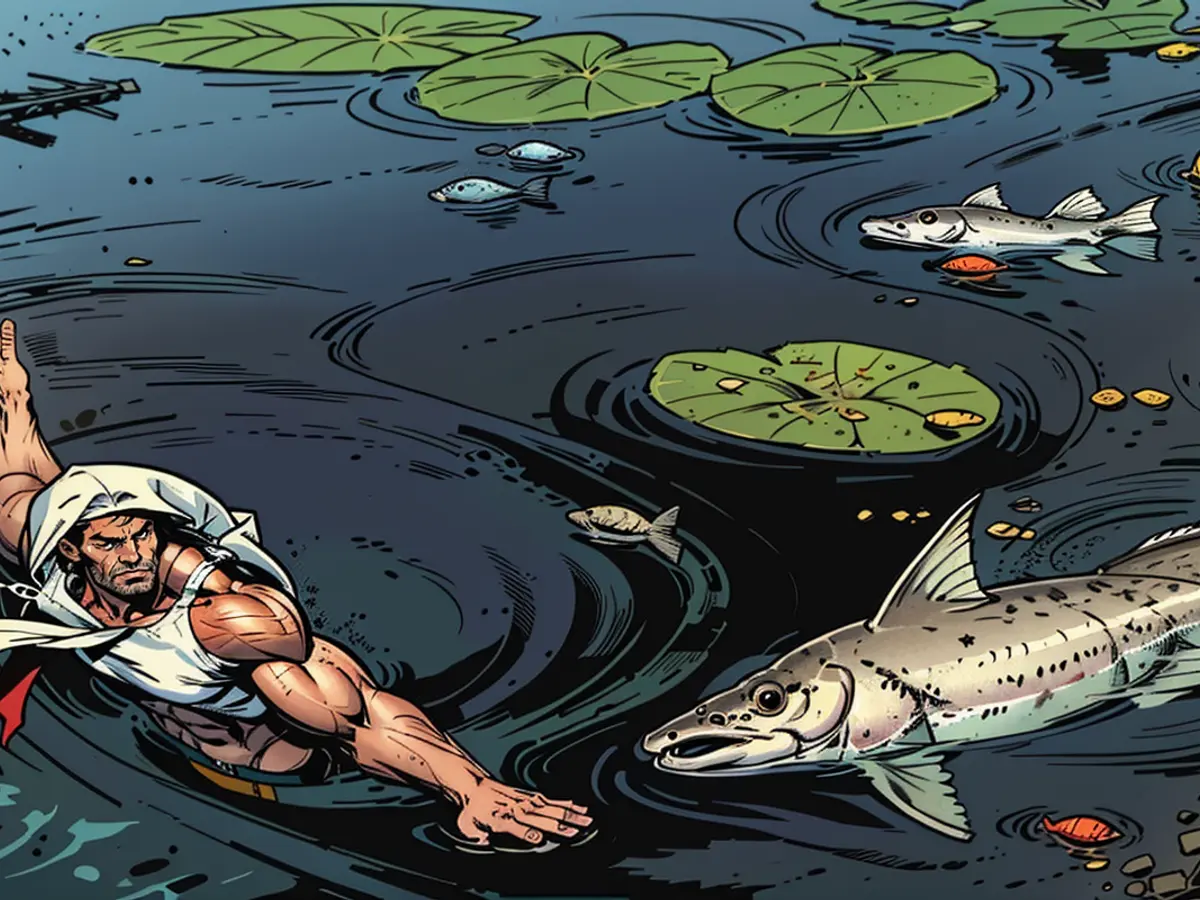Surroundings or natural setting. - Concerns rise over gold algae in the Oder and deceased fish in the border river.
Discovery of Dead Fish and Spread of Toxic Golden Algae in the Oder Leads to Further Action from Environment Ministry in Brandenburg
In light of the discovery of dead fish and the spread of toxic golden algae in the Oder, Brandenburg's Environment Ministry will take additional measures. It is unclear yet how harmful the pollution of the river could be for wildlife. The State Environment Office reported that only a few dead fish have been found so far. On Wednesday, the Environment Department will convene to discuss potential actions based on the latest data, the office said. Results are expected by early evening.
Authorities Respond to Warning Signals
Two years after the Oder's environmental disaster, authorities are responding to warning signs. Dead fish have been discovered in the German-Polish border river. The potentially harmful Prymnesium parvum, which was responsible for a large-scale fish kill in the summer of 2022, is spreading, according to measurements. The highest warning level 3 has been issued, indicating a bloom of Prymnesium parvum is expected.
Concern Over Golden Algae Growth
Christian Wolter, a fisheries ecologist at the Leibniz Institute for Freshwater Ecology and Inland Fisheries (IGB), expressed concern about the spread of the golden alga Prymnesium parvum. While it's difficult to predict how it's progressing, he emphasized the necessity to analyze why the alga is spreading more aggressively than last year. This research could provide researchers with new insights.
The IGB is studying the conditions of the Oder and its algae.
Dead Fish Found in Oder Side Waters
After last year's warnings that the danger of another disaster on the Oder had not been averted, environmentalists are urging for better protection of the Polish-German border river.
Greenpeace: Salt Injections Cause Problem
Greenpeace blames the injection of salty wastewater from Polish mines for the current situation. They accuse the government of inaction since the 2022 fish kill. On Wednesday, Greenpeace criticized: "The repercussions have become noticeable and measurable - salt and chlorophyll content in the Oder has been increasing steadily in the past weeks and months." Halting the salt injections and monitoring by Polish authorities are necessary to prevent more environmental disasters, said Greenpeace's environmental toxicologist, Julios Kontchou.
Wolter said that while the dead fish were mostly found in side waters of the Oder, not the main stream, their deaths could also be related to a lack of oxygen. On Tuesday, over 60 centimeter long zander and pike were found dead between water lilies in Frankfurt (Oder)'s Winterhafen.
Heightened Algae Level and Potential Harm
The state environmental office reported Tuesday evening that the Oder's algae levels have been exceptionally high for several days, with golden algae dominating. The chlorophyll level, a measurement for the algae population, has reached a new maximum at the Frankfurt (Oder) monitoring station, and no dilution effect is expected with the rising water levels. Values for electrical conductivity also signaled a high salt content. According to the authority, this is a marker for the salt concentration. Furthermore, measurements for pH value and oxygen also characterize the course of an algae bloom. Therefore, the state environmental office recommended last week to cease any water transfers from the Oder into the Oder-Spree Canal as a precaution.
Experts suspect high salt content, low water levels, high temperatures, and the toxin from the golden algae were responsible for the mass fish deaths in the Oder in 2022. Polish authorities plan to limit the spread of the golden algae, known to produce a lethal toxin. The entire riverbed and its tributaries are now infested with the strain, according to Brandenburg's Environmental Office. Regular water quality readings are taken and evaluated at automated monitoring stations in Brandenburg's section of the Oder.
Read also:
- The Environment Ministry in Brandenburg is considering additional measures due to the spread of toxic golden algae in the Oder and the discovery of dead fish, potentially affecting wildlife.
- The Golden Algae, Prymnesium parvum, which caused a large-scale fish kill in 2022, is spreading again in the Oder, prompting the issuance of a warning level 3.
- Christian Wolter, a fisheries ecologist, is concerned about the aggressive spread of Prymnesium parvum, and research could provide insights into why it's spreading more than last year.
- Greenpeace blames the injection of salty wastewater from Polish mines for the current situation, accusing the government of inaction since the 2022 fish kill.
- According to reports, the chlorophyll level in the Frankfurt (Oder) monitoring station has reached a new maximum, indicating a high population of golden algae, with salt content and low oxygen levels also contributing to the health of the river and its animals.








